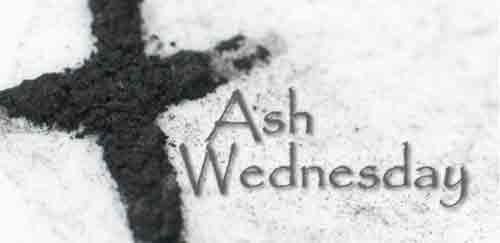Ash Wednesday 2012
22/02/12 05:37
“Remember that you are dust, and to dust you shall return.” It is a simple reminder of our mortality. It sometimes surprises me how little we think of our own death and how much of our lives we live as if we might go on forever. Our thinking is, in part, a testament to the power of life. Even in the face of the death of a loved one, in the depths of grief, life triumphs. We discover the strength to go on with our lives. We find sources of hope. We endure.

Ash Wednesday is one of those days that is really different for me as a pastor. There are small gestures of touch that are a part of my job. I shake hands after worship. I offer blessings in homes and hospitals. I place my hand on the shoulder of another. But on Ash Wednesday, I touch the people who come to the service one by one. As others wait, I dip my fingers in the ashes and make the sign of the cross on each person and repeat the words: “Remember that you are dust, and to dust you shall return.”
I will not be pastor of these people forever. Our moment is finite. It will come to an end. For some of the people I greet this Ash Wednesday, I will officiate at their funeral. Others will live beyond the time of my being pastor in this place. We live and work in a narrow window of time.
Having the people come by one by one, looking each in the eyes, and saying the simple, yet powerful words – these things never fail to move me deeply.
 For much of our lives, we focus our attention on differences. We silently measure differences in wealth, power, beauty, fame, and more. We evaluate others in part by whether or not they pose a threat to our way of life. Ash Wednesday reminds us that we all share the simple fact of mortality.
For much of our lives, we focus our attention on differences. We silently measure differences in wealth, power, beauty, fame, and more. We evaluate others in part by whether or not they pose a threat to our way of life. Ash Wednesday reminds us that we all share the simple fact of mortality.
In ancient times, ashes were a sign of mourning. The rituals of grieving involved dusting oneself with ashes. The sadness felt on the inside found an outward expression in a simple ritual. Ashes were common and readily available. Because fires were used for cooking and heating, every home had an ample supply. There are many places in the Bible where the ashes of mourning were also used as a sign of sadness for wrongs or sins committed. Ashes became a sign of repentance – of turning away from hurtful actions. Job, Jeremiah, Daniel and many others used ashes as a sign of making significant changes in their lives.
We use ashes to mark the beginning of Lent. Our confirmation class carefully burned the palms from last year’s Palm Sunday celebrations. The ashes were saved, sifted and mixed with a few drops of oil. They sit in my office awaiting the ceremonies of this day. The day marks the beginning of Lent. Ash Wednesday does not stand alone. It is the beginning of a season of repentance. There are plenty of Biblical stories that speak of 40-days of fasting. Moses and the people of Israel fasted and repented for 40 days after the making of the golden calf. Contemporary Jews have a 40-day period of repenting during the High Holy Days from Rosh Chodesh Elul to Yom Kippur. Jesus spent 40 days in the wilderness fasting and praying. During this time he was also tempted. Contemporary Christian Lenten observances last for forty days. Sundays are not counted, so we have six weeks of Lent.
Lent is a traditional time to give up luxuries. In Ireland, Ash Wednesday is the national No Smoking Day. Making a connection between quitting smoking and giving up luxury for Lent works in that nation. Many Christians think of small luxuries that they can give up as a sign of commitment to a different way of life. Sometimes the things given up are not all that significant. The process of giving things up can be deeply meaningful or a fairly shallow ritual – it all depends on the attitude of the person.
We view lent as a time when we should give something up – or feel guilty because we don’t. But Ash Wednesday gives us an opportunity to think differently. A season of repentance can be a season of new thinking. What if we gave up old ways of thinking for Lent? What would it mean to give up our anxieties? How could we give up judging others? Imagine what would happen if we decided to give up complaining? Could we give up feeling discouraged? Maybe this is the year to give up making excuses? Is this the time to give up worry?
 Today we begin. Ash Wednesday is not an end in and of itself. It is the start of a journey. We know a bit of the conclusion of that journey. God’s promise to us is that the time of darkness will end – the light will come. Making real changes in our lives takes time. Lent gives us the time. It can be a season of giving up old ways of thinking and embracing new relationships with each other and with God.
Today we begin. Ash Wednesday is not an end in and of itself. It is the start of a journey. We know a bit of the conclusion of that journey. God’s promise to us is that the time of darkness will end – the light will come. Making real changes in our lives takes time. Lent gives us the time. It can be a season of giving up old ways of thinking and embracing new relationships with each other and with God.
In our family, Ash Wednesday will forever be a day that carries a twinge of grief. It was on Ash Wednesday last year that Susan’s father died. This wonderful, kind, loving man ended his life’s journey in the early hours of the day. He simply didn’t wake up. We began our Lent with a season of grief. It took us a while to imagine what it meant for us to go on now that he has died. But our happy memories far outweigh our sad ones. We cannot think of him without thinking of how much he meant to us and how good it was to have him in our lives. Grief gives way to hope. Even though we will all one day die from this life, God’s gift of life has the final victory.
Still it is good each year to pause and to be reminded that we are mortal. It is good to remember that we are dust and to dust we will return.

Ash Wednesday is one of those days that is really different for me as a pastor. There are small gestures of touch that are a part of my job. I shake hands after worship. I offer blessings in homes and hospitals. I place my hand on the shoulder of another. But on Ash Wednesday, I touch the people who come to the service one by one. As others wait, I dip my fingers in the ashes and make the sign of the cross on each person and repeat the words: “Remember that you are dust, and to dust you shall return.”
I will not be pastor of these people forever. Our moment is finite. It will come to an end. For some of the people I greet this Ash Wednesday, I will officiate at their funeral. Others will live beyond the time of my being pastor in this place. We live and work in a narrow window of time.
Having the people come by one by one, looking each in the eyes, and saying the simple, yet powerful words – these things never fail to move me deeply.

In ancient times, ashes were a sign of mourning. The rituals of grieving involved dusting oneself with ashes. The sadness felt on the inside found an outward expression in a simple ritual. Ashes were common and readily available. Because fires were used for cooking and heating, every home had an ample supply. There are many places in the Bible where the ashes of mourning were also used as a sign of sadness for wrongs or sins committed. Ashes became a sign of repentance – of turning away from hurtful actions. Job, Jeremiah, Daniel and many others used ashes as a sign of making significant changes in their lives.
We use ashes to mark the beginning of Lent. Our confirmation class carefully burned the palms from last year’s Palm Sunday celebrations. The ashes were saved, sifted and mixed with a few drops of oil. They sit in my office awaiting the ceremonies of this day. The day marks the beginning of Lent. Ash Wednesday does not stand alone. It is the beginning of a season of repentance. There are plenty of Biblical stories that speak of 40-days of fasting. Moses and the people of Israel fasted and repented for 40 days after the making of the golden calf. Contemporary Jews have a 40-day period of repenting during the High Holy Days from Rosh Chodesh Elul to Yom Kippur. Jesus spent 40 days in the wilderness fasting and praying. During this time he was also tempted. Contemporary Christian Lenten observances last for forty days. Sundays are not counted, so we have six weeks of Lent.
Lent is a traditional time to give up luxuries. In Ireland, Ash Wednesday is the national No Smoking Day. Making a connection between quitting smoking and giving up luxury for Lent works in that nation. Many Christians think of small luxuries that they can give up as a sign of commitment to a different way of life. Sometimes the things given up are not all that significant. The process of giving things up can be deeply meaningful or a fairly shallow ritual – it all depends on the attitude of the person.
We view lent as a time when we should give something up – or feel guilty because we don’t. But Ash Wednesday gives us an opportunity to think differently. A season of repentance can be a season of new thinking. What if we gave up old ways of thinking for Lent? What would it mean to give up our anxieties? How could we give up judging others? Imagine what would happen if we decided to give up complaining? Could we give up feeling discouraged? Maybe this is the year to give up making excuses? Is this the time to give up worry?

In our family, Ash Wednesday will forever be a day that carries a twinge of grief. It was on Ash Wednesday last year that Susan’s father died. This wonderful, kind, loving man ended his life’s journey in the early hours of the day. He simply didn’t wake up. We began our Lent with a season of grief. It took us a while to imagine what it meant for us to go on now that he has died. But our happy memories far outweigh our sad ones. We cannot think of him without thinking of how much he meant to us and how good it was to have him in our lives. Grief gives way to hope. Even though we will all one day die from this life, God’s gift of life has the final victory.
Still it is good each year to pause and to be reminded that we are mortal. It is good to remember that we are dust and to dust we will return.